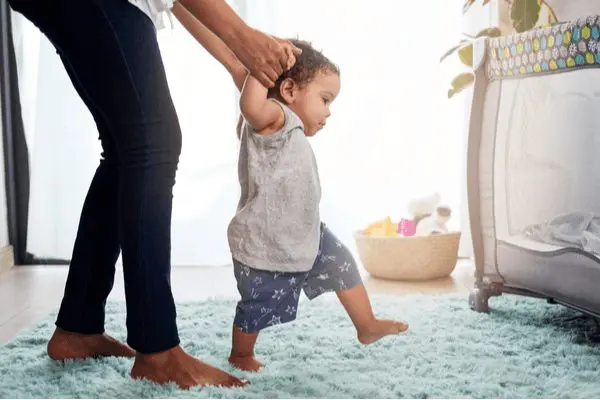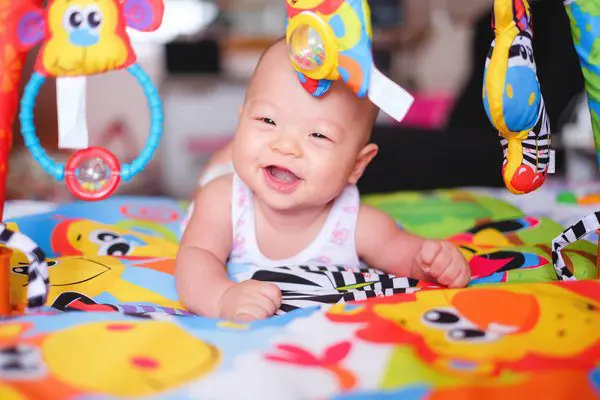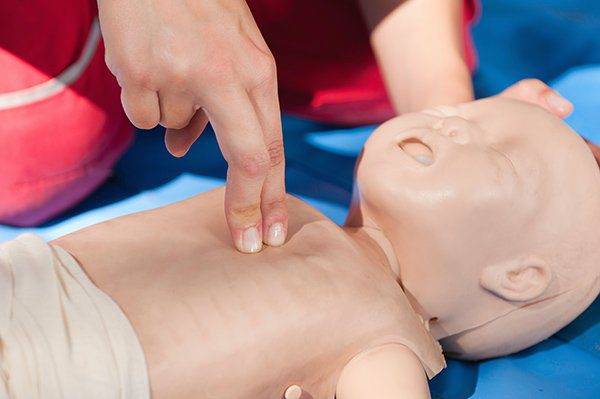The first year flies by. Before you know it, you’ve got a toddler walking around, needing potty trained and telling you no. But in that first year, there are so many amazing things that happen with your baby.
Baby’s major milestones are worth watching for a couple of reasons. You want to celebrate these moments with pictures, notes in the baby book, or calls to grandma. You also want to be aware if one is missed so you can discuss with your doctor.
As babies grow, they develop in four areas – social, language, large motor development, and small motor development. The milestones will happen at various times, so it’s important to remember not to compare your baby to other babies or development charts. Instead, wait a bit longer to see if there is a change, and if not, speak with your doctor about your concerns.
First-Year Milestones
Month 1-2
In the first two months, your baby’s vision is pretty fuzzy, so they will enjoy close objects (within 30 inches).
Social
Your baby loves being held, hugged, and massaged as touch is an important part of his or her social well-being. Your voice is also soothing and exciting, so sing and coo and talk to them as much as possible. Baby’s social development will include:
- Quieting down when a voice is heard
- Staring at parents when they speak
- A smile in response to various stimuli
Language
Though your baby can’t talk, they are already learning verbal cues and trying to vocalize. The primary way to communicate for baby is through crying—and you should expect that to go on for at least three hours a day. Other ways baby will communicate:
- Throaty sounds
- Makes noises other than crying
- Vocalizes to familiar noises or voices
Large and small motor development
Your baby’s body is wonderfully made, and it continues to transform with each passing month. Right now, your baby is developing the muscles and movements needed to become a mover. Large and small motor development during the first two months include:
- Turning the head from side to side when laying on the back
- Lifting head almost 45 degrees when on the stomach
- A strong grasp reflex in month one that decreases into month two
- Following dangled objects with eyes
Month 3-4
In the third and fourth month, your baby’s eyes have advanced quite a bit. They can see all the colors of the rainbow and can follow an object in a 180° arc. This gives more opportunities to work on the types of development as baby is more interested in what they are seeing.
Social
Baby will begin to be more social in the third and fourth months. You’ll be excited to discover the first time your little one recognizes you. A few more milestones you should watch for:
- Baby will smile when they see someone familiar
- Recognizes faces, voices and objects
- Enjoys being bounced and swung
- Baby may begin to react positively to your singing and playing
Language
Your baby will begin to be more responsive to your own talking, and the communication between you and your child is starting to get fun. You’ll also see:
- Baby will begin giggling
- Crying will be more deliberate, and different reasons may have different sounds. Also, your baby may pause crying to see if you’re paying attention
- Baby will begin making consonant sounds
- Language will include coos and squeals
Large and small motor development
Baby is really getting ready to move. You’ll notice they can bear weight on the legs when held upright, plus they will have more head control. More motor development milestones:
- Raises head and shoulders off the floor during tummy time 45- to 90-degree angle (month 3)
- Raises head and chest off the floor during tummy time at a 90-degree angle (month 4)
- Grasp reflex disappears
- Clutches his or her own hands and grabs objects, blankets, etc.
Month 5-6
It’s time to introduce your baby to solids when month six rolls around. Speaking of rolling—your baby will start to do that too.
Social
Your baby is able to focus and pay attention better now, so you can introduce reading more. Other social milestones baby will reach:
- Can tell the difference between family members and strangers
- Doesn’t like toys being taken away
- Recognizes parents
Language
You’ll start to hear sounds that seem awfully familiar to those words you want to hear. The language development in the fifth or sixth months include:
- Says vowel-consonant combinations
- Says one-syllable sounds like “da” “ma” “bi”
Large and small motor development
Baby really gets started on the movement journey between five and six months. Expect to see these developments:
- Baby rolls from stomach to back (month 5) and back to stomach (month 6)
- Playing with toes
- Bears weight on hands by lifting self off the ground during tummy time
- Begins taking feet and objects to mouth
- Holds head up when sitting
Month 7-8
Are you ready for crawling? What about for your baby to begin initiating peek-a-boo with you? If not, get ready in months seven and eight when these things begin!
Social
Your baby will begin to respond to their name during these months and will even look at you when you say no, so you’re able to start setting boundaries. You’ll also see some of these social development markers:
- Shows enthusiasm when playing
- Listens to familiar words
- Baby starts resisting diaper changes and getting dressed
Language
In addition to learning their own name, baby is going to do the following:
- Begin saying consonant and vowel combination words like mama and dada, though they won’t know what these mean yet
- Understands the word no (by month 8) but will listen to it selectively
Large and small motor development
This is a big period for motor skill development. Babies are forming the muscles they need now to walk and refining the skills they need for a variety of other big kid movements. Expect to see your baby performing the following actions:
- Sits without support
- Bears weight on feet and begins to pull up on furniture
- Transfers objects between hands
- Picks up objects using different fingers and thumb
- Reaches for toys, people, food, etc.
Month 9-10
Get ready to watch baby crawl all over the place! Month nine and ten are when most babies start really moving around. They also begin to understand language more and play even harder.
Social
You’ll notice your baby is more interested in making you happy with their actions beginning in the ninth month. Along with that, you’ll see these milestones:
- Tries to stop face washing or other unpleasant activities with more than crying
- Plays games like Patty Cake
- Smiles at themselves in the mirror and recognizes who they are.
Language
Don’t be fooled by month nine—your baby knows what no means. Keep your boundaries and positive reinforcement rolling so they continue to understand appropriate behaviors. More language developments will include:
- Means it when he or she says mama and dada
- Can speak at least one other word (typically small words like hi, no, or bye)
- Waves good-bye
Large and small motor development
Here goes your baby, no longer immobile. Get ready for the chase as you see your baby begin to:
- Sit for a longer period unaided
- Crawl around
- Take a step or two
- Use thumb and index finger to pick objects up
- Begin displaying a preference for right or left hand
- Sits by falling down
Month 11-12
You’re nearing the end of the first year. Congrats to you! And a big congrats to all the work your baby has done during this year of development. You’re almost to the smash cake, but before you get that sweet, one-year-old reward, look for the following milestones to celebrate too.
Social
Baby will begin showing more independence in the 11th and 12th months. In fact, you may find that your baby is rarely shy in places they know well, as they crawl around and explore their surroundings. They will also be excited to see familiar faces and may begin to have trouble when you leave. A few more development checkpoints to watch for:
- Baby will start to show affection through hugs and kisses
- Imitating sounds of animals or objects may become a new favorite pastime
Language
Your little darling will be able to speak more words and understand more of what you’re saying by age one. They may also meet these milestones:
- Baby will begin shaking their head for no
- Can speak three or more words in addition to mama and dada
- Repeats the same words
- Recognizes objects by name and understands several words
Large and small motor development
If Baby is up and walking, you’re in full-on toddler mode. Though walking is not always started by month 12. Babies can take up to 16 months before they begin to really walk, so make sure if you’ve got questions or concerns, you’re fleshing these out with your doctor. Before you get concerned, check the other milestones. Is your baby standing and tapping their feet? Then give it time. Walking will come soon. Those last motor skill development milestones to watch for before a year include:
- Holds one hand to walk
- Turns pages in a book
- May stack objects on top of each other
- Places objects into containers
- May walk unaided
- Rolls a ball back and forth
Throughout the first year, don’t forget to reach out to your doctor if you have concerns. Missing one or two milestones in a month and picking them up later on is perfectly normal. Missing multiple milestones of the same type (such as several months of language milestones and never picking them up) could require a check-up.
Congrats! Now you’ve made it to year one and you’re ready for your baby to put all those skills to work by messing up a tiny cake in the name of memories. Give your baby a big hug each time you see a milestone met and encourage the growth by playing, talking, and reading regularly to them.



